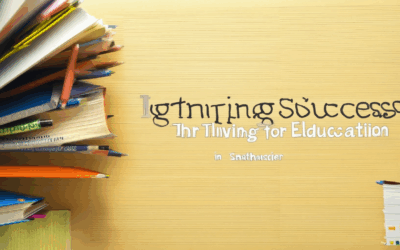Understanding the path to academic readiness for college is a cornerstone of success in higher education. In today’s competitive academic environment, being prepared for the challenges of college extends far beyond memorizing facts or mastering subjects. It involves cultivating essential skills, developing a growth mindset, and equipping oneself with the tools needed to thrive in a dynamic world. This comprehensive guide dives into the intricacies of what it means to be college-ready, offering insights, strategies, and actionable steps to help students navigate the transition from high school to higher education seamlessly. From defining what college readiness entails to exploring practical ways to enhance academic performance, this resource serves as a roadmap for success, ensuring readers are well-prepared to meet the demands of college life and beyond.
Key Takeaways
– Understanding Academic Readiness: Develop the critical skills, perseverance, and creativity needed to thrive in academic and professional environments.
– Measuring Success: Gauge readiness through work ethic, academic performance, engagement, and adaptability.
– Long-Term Benefits: Building academic readiness paves the way for lasting success in college and beyond.
– Resource Utilization: Leverage tools from platforms like Enroll Maven to enhance your academic journey.
– Strategic Growth: Stay organized, seek help, engage actively, and set achievable goals for sustained progress.
– Demonstrating Readiness: Showcase your preparation via standardized tests, strong academic records, and diverse extracurricular involvements.
– Key Components of College Readiness: Focus on financial literacy, a solid academic foundation, and social-emotional development to excel in college.
What is Considered College Readiness?
College readiness encompasses a broad spectrum of preparation necessary for students to successfully transition into and thrive within post-secondary education. It goes beyond academic credentials, encompassing personal development, financial planning, and life skills essential for university-level studies.
Key Components of College Readiness
- Academic Preparation: A solid foundation in core subjects like mathematics, science, literature, and history. Strong critical thinking, problem-solving, and study habits are equally vital.
- Personal Development: Self-awareness, time management, adaptability, and independence are crucial skills for college success. These traits enable students to navigate the challenges of university life effectively.
- Financial Literacy: Understanding budgeting, saving, and managing debt is essential. Students should also explore scholarship and grant opportunities to minimize financial burdens.
- Health and Wellness: Physical and mental health are foundational to academic performance. Maintaining a balanced lifestyle and seeking support when needed are key components of readiness.
Resources for College Readiness
To enhance your college readiness, consider exploring platforms like Enroll Maven , which offers valuable resources and guides tailored to help students prepare for higher education. Additionally, organizations such as the College Board and ACT provide extensive tools and information to aid in your journey.
Conclusion
College readiness is a multifaceted concept that requires attention to academic, personal, and financial aspects. By dedicating effort to developing these areas, you can set yourself up for a successful and fulfilling college experience. Remember, every step you take toward preparation is a step toward achieving your future goals.
Improving Academic Readiness for College
To enhance your academic readiness for college, consider the following structured approach:
- Academic Preparation:
- Enroll in challenging high school courses, including Advanced Placement (AP), International Baccalaureate (IB), and Dual Enrollment programs.
- Focus on developing strong foundational skills in mathematics, science, and English, as these are often emphasized in college curricula.
- Stay engaged in class by practicing active listening and regularly summarizing lecture content to ensure comprehension.
- Standardized Testing Preparation:
- Thoroughly prepare for standardized tests like the SAT or ACT by utilizing practice exams and focusing on weak areas.
- Consider seeking tutoring or study groups to aid in test preparation and skill development.
- Study Habits and Time Management:
- Develop effective study habits by creating a study schedule and choosing a quiet, distraction-free environment.
- Break down study materials into manageable chunks to enhance retention and understanding.
- Master time management techniques to balance coursework, extracurricular activities, and personal life effectively.
- Extracurricular Involvement:
- Participate in clubs, sports, or volunteer work to demonstrate dedication and leadership qualities.
- Engage in activities that foster teamwork, responsibility, and a well-rounded personality.
- Mentorship and Feedback:
- Seek guidance from teachers, mentors, and counselors to gain insights into college expectations and application processes.
- Learn from failures by seeking feedback and using challenges as opportunities for growth and resilience.
- Curiosity and Motivation:
- Explore hobbies and interests outside academia to maintain engagement and discover personal passions.
- Stay curious and motivated by setting personal goals and continuously seeking knowledge beyond the classroom.
How Do You Academically Prepare for College?
To academically prepare for college, it’s essential to approach the process methodically and with a clear plan. Here’s a step-by-step guide to help you get started:
- Understand College Requirements:** Before diving into studying, familiarize yourself with what’s expected in college. Review course syllabi, textbooks, and any additional materials your professors may use. This will give you a better idea of how to approach your studies.
- Set Clear Academic Goals:** Define short-term and long-term academic objectives. Whether it’s mastering a particular subject or excelling in coursework, having defined goals can help you stay focused and motivated.
- Develop Strong Study Habits:** Establish consistent study routines that work best for you. Use techniques like active reading, note-taking, and regular review sessions to retain information effectively. Tools like flashcards or apps can also aid in memorization.
- Practice College-Level Tests:** If you’re applying to colleges, practice standardized tests like the SAT, ACT, or GRE. These exams often play a crucial role in admissions decisions, so investing time in preparation is worthwhile. Consider using resources like Khan Academy or Coursera for guided practice.
- Expand Your Vocabulary and Knowledge Base:** College-level courses often require a broader vocabulary and deeper understanding of various subjects. Dedicate time to reading books, articles, and academic journals to expand your knowledge base.
- Master Time Management:** College life often requires balancing multiple responsibilities. Learn to manage your time effectively by prioritizing tasks, setting deadlines, and using tools like planners or digital calendars to stay organized.
- Seek Academic Support:** Don’t hesitate to ask for help when needed. Talk to teachers, mentors, or academic advisors who can provide guidance and resources to assist your academic journey.
- Stay Updated on Trends:** Keep an eye on the latest developments in your field of interest. Attend workshops, join online forums, or subscribe to newsletters to stay informed about new discoveries and advancements.
- Review Feedback Regularly:** Pay attention to feedback from professors and peers. Use this information to identify areas for improvement and adjust your study strategies accordingly.
What Does Academic Readiness Mean?
Academic readiness refers to the preparedness of an individual to effectively navigate and succeed in academic environments and beyond. It encompasses a combination of skills, traits, and habits necessary to thrive in school, college, and professional life. Here’s a breakdown of its key components:
Key Components of Academic Readiness
- Skills: Possessing the ability to think critically, solve problems, communicate effectively, and stay organized.
- Perseverance: Developing resilience to overcome challenges and setbacks, maintaining motivation despite difficulties.
- Creativity: Cultivating innovative thinking to approach problems uniquely and adapt to changing circumstances.
How Is Academic Readiness Measured?
Academic readiness is often assessed through indicators such as:
- Work ethic and dedication to learning
- Academic performance (grades, test scores)
- Engagement in extracurricular activities and projects
- Adaptability and openness to new ideas
Importance of Academic Readiness
Developing academic readiness early in life is crucial for long-term success. It equips individuals with the tools needed to adapt to evolving educational demands and professional challenges. By fostering these qualities, students can confidently embrace future opportunities and contribute meaningfully to their fields.
Resources to Build Academic Readiness
Enroll Maven offers valuable resources to help students develop and strengthen their academic readiness. From effective learning strategies to college preparation guides, the platform supports educational growth and empowers learners to excel. Explore their comprehensive articles and tools designed to enhance academic success.
Strategies for Enhancing Academic Readiness
- Stay organized with study schedules and note-taking systems.
- Seek help when needed and utilize available resources.
- Participate in discussions and collaborate with peers.
- Set realistic goals and celebrate progress toward achieving them.
By understanding and actively working on academic readiness, individuals can lay a strong foundation for their educational journey and future endeavors.
How to Demonstrate Academic Readiness
Demonstrating academic readiness involves a combination of various elements that showcase your preparedness for college-level coursework. Here’s a structured approach:
- Standardized Tests: Achieve passing scores on assessments like CASAS ABE Level E (245-250) or the Test of Basic Education (TABE) Level A. These tests evaluate foundational skills in reading, writing, and mathematics.
- High School Transcript: Maintain a solid GPA, particularly in core subjects such as English and mathematics. Strong academic performance indicates readiness for college-level challenges.
- SAT or ACT Scores: Achieve competitive scores on these college entrance exams, which assess critical thinking, problem-solving, and verbal/math proficiency.
- Participation in Advanced Placement (AP) or Honors Classes: Enrolling and performing well in these advanced courses demonstrates a commitment to academic rigor and the ability to handle college-level material.
- Extracurricular Activities and Clubs: Involvement in clubs, sports, or volunteer work highlights organizational skills, leadership qualities, and time management abilities, all of which are crucial for college success.
- Work Experience and Internships: Gainful employment or relevant internships provide practical experience and real-world application of academic knowledge, enhancing your readiness for college.
- Community Involvement: Volunteering or participating in community service projects demonstrates empathy, responsibility, and a well-rounded character, which are valued in college settings.
- Dual Enrollment or Concurrent Enrollment Programs: Enrolling in dual enrollment or concurrent enrollment programs allows you to earn college credits while still in high school, showcasing your ability to manage advanced academic demands.
- Online Courses or Self-Study: Completing online courses or independent study through reputable platforms like Khan Academy or Coursera illustrates a proactive approach to learning and self-improvement.
- Recommendation Letters: Strong recommendation letters from teachers, mentors, or coaches can provide personalized insights into your character, work ethic, and academic potential.
By effectively combining these elements, you can present a comprehensive demonstration of your academic readiness, giving colleges a well-rounded understanding of your qualifications and potential for success.
What Are the Three Most Important Components of College Readiness?
The journey to college success involves several critical components that work together to ensure students are fully prepared for the challenges and opportunities ahead. Here’s a breakdown of the three most important aspects:
- Financial Literacy : Understanding the costs associated with college, including tuition, fees, housing, and living expenses, is essential. Students should also explore scholarships, grants, and financial aid options like the FAFSA program to manage their expenses effectively.
- Academic Foundation : A strong high school education and preparation for college-level coursework are foundational. Addressing any gaps in basic skills through tutoring programs or summer bridge courses can significantly enhance college readiness.
- Social-Emotional Readiness : College life involves more than academics—it includes building relationships, managing stress, and developing life skills. Students should cultivate resilience, time management, and communication abilities to thrive in this environment.
To further support college readiness, consider exploring resources from platforms like College Board for SAT preparation and Pell Grant information to gain a competitive edge.
By focusing on these key components, students can navigate the complexities of college life with confidence and ease.









0 Comments